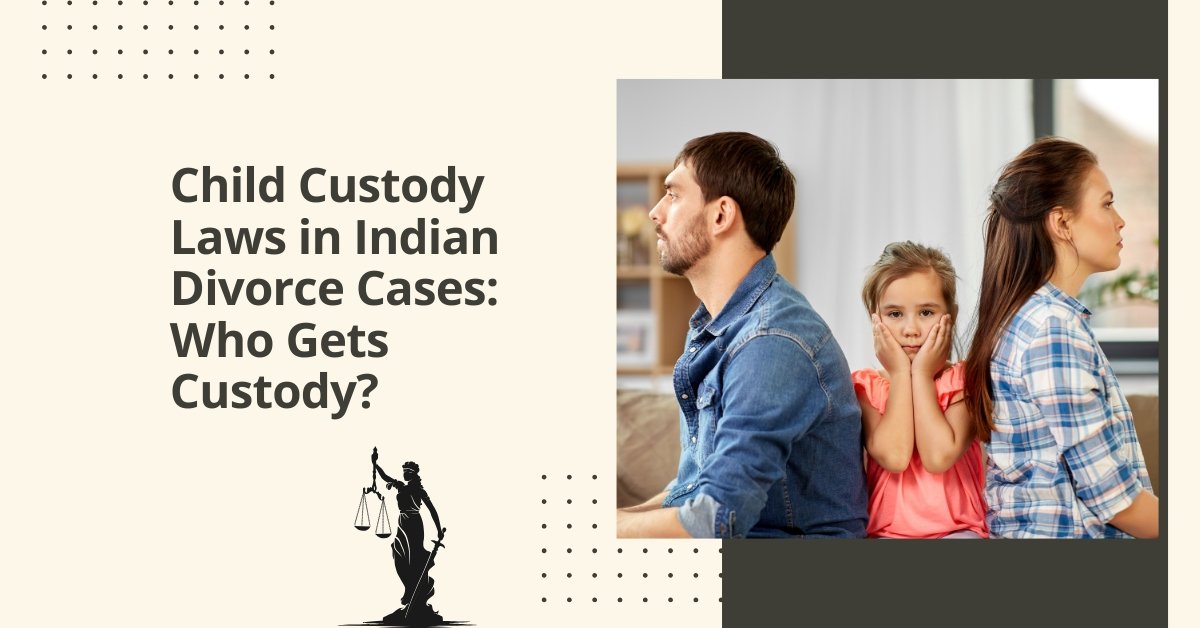Child Custody Laws in Indian Divorce Cases: Who Gets Custody?

Divorce is a challenging and emotionally draining process, particularly when children are involved. One of the most complex and crucial aspects of divorce proceedings is determining child custody. In India, the welfare of the child is paramount, and the law provides clear guidelines regarding custody. However, the decision on who gets custody depends on various factors, including the child’s age, the parents’ ability to provide, and the child’s best interests.
Understanding Child Custody in India
Child custody refers to the legal right to care, control, and make important decisions regarding the child’s upbringing, including education, health, and religious practices. In India, the custody of children is decided under different laws depending on the religion and personal laws governing the parents. These laws ensure that the child’s welfare is the primary consideration, and no decision is made without taking into account the child’s best interests.
Types of Child Custody
There are generally three types of child custody arrangements in Indian divorce cases:
Physical Custody
This refers to where the child resides. One parent is granted physical custody of the child, and the other may have visitation rights or limited interaction. The parent with physical custody is responsible for day-to-day care, while the other parent typically has visitation rights.
Legal Custody
This refers to the right of the parent to make important decisions regarding the child’s life, such as education, healthcare, and religious practices. Legal custody can be shared between both parents or awarded to one parent, depending on the court’s evaluation of the situation.
Joint Custody
In joint custody, both parents share physical and legal custody of the child. While the child may spend time in both parents’ homes, decisions regarding the child’s welfare are made jointly. This arrangement is typically used when parents are on amicable terms and can cooperate in raising the child.
Custody Under Hindu Law
In India, the custody of children is governed by different laws depending on the religion of the parents. Under Hindu law, custody is primarily guided by the Hindu Minority and Guardianship Act, 1956, and the Guardians and Wards Act, 1890.
Hindu Minority and Guardianship Act, 1956
According to this Act, the father is the natural guardian of a minor child, while the mother is the guardian in respect to the child’s person. However, the law takes into account the child’s welfare, and custody can be granted to the mother or father based on the child’s best interests.
Guardians and Wards Act, 1890
This Act allows either parent to apply for custody of the child in the court. The primary consideration here is the welfare of the child, which includes factors like the child’s age, emotional needs, and the ability of the parents to care for the child.
In Hindu law, children under the age of 5 (particularly a son) are generally placed in the mother’s custody, while children above 5 are often considered in the context of who can provide a better living environment. The court’s decision will take into account the preferences of the child (depending on age), the parents’ financial stability, and the overall environment each parent can offer.
Custody Under Muslim Law
Muslim law provides for the custody of children under the personal laws of the religion. According to Muslim personal law, the mother is generally granted custody of children under the age of 7, with certain exceptions. After the age of 7, custody may be given to the father, unless there is a reason why this would not be in the child’s best interests.
The key difference between Hindu and Muslim law is that in Muslim law, custody is more flexible, with the father having the ultimate say in the matter. However, the welfare of the child remains the deciding factor, and the courts are willing to grant custody to the mother if it is deemed necessary.
Custody Under Christian Law
Christian law in India is governed by the Indian Divorce Act, 1869, and similar to other laws, places the welfare of the child as the primary concern. For Christian couples, the court considers the mother the natural guardian of children under the age of 5. However, after the age of 5, the court looks into the child’s welfare and may grant custody to either parent depending on their ability to provide for the child’s physical and emotional needs.
Custody Under Parsi Law
The Parsi law follows similar principles as Christian law, as the governing statutes are derived from the Indian Divorce Act. A mother is generally entitled to the custody of a child under 5, while the father may be granted custody of older children, again based on the welfare principle. The custody arrangements are made after evaluating the specific circumstances and needs of the child.
Key Factors Considered in Custody Decisions
The decision regarding child custody is not a straightforward one. The court considers various factors to determine the best interests of the child. These include:
Child’s Age and Gender
Younger children, particularly infants and toddlers, are often awarded to the mother, as they are considered to have a stronger emotional bond with her. However, the court will also evaluate the specific situation.
Parental Fitness
The court examines the physical and emotional fitness of both parents to raise the child. This includes evaluating their mental stability, financial condition, and overall ability to provide a safe and loving environment for the child.
Child’s Welfare
The welfare of the child is the primary factor. Courts ensure that the child’s emotional, psychological, and physical needs are met, and that they will be raised in a stable environment.
Parental Agreement
If both parents agree on a custody arrangement, the court will likely honor the agreement as long as it aligns with the child’s best interests.
Child’s Preference
The preference of the child is considered, particularly if the child is of a sufficient age to make an informed decision. Typically, a child over the age of 9 may be asked about their preference, but the court does not solely rely on this opinion.
Impact of Joint Custody
Joint custody is gaining popularity in Indian divorce cases, as it allows both parents to share the responsibility and care for the child. Joint custody is beneficial for the child as it allows them to maintain a relationship with both parents, which is often crucial for their emotional and psychological development. However, it is only feasible if both parents are capable of cooperating and communicating effectively.
Prioritizing the Child’s Best Interests in Custody Decisions
Child custody decisions in Indian divorce cases are guided by the principle of the child’s best interests. While laws vary across religions, the emphasis remains on ensuring the child’s welfare, considering their age, emotional needs, and the parents’ ability to provide. If you’re navigating custody disputes, consulting the best divorce lawyer in Pune can help you understand your legal rights and options. The evolving trend of joint custody reflects a growing recognition of the importance of both parents in a child’s life. Ultimately, the Indian legal system aims to strike a balance between the rights of the parents and the needs of the child, ensuring that the child’s well-being is always the central concern.
Most Recent Posts
Category
Explore Our Services
Empower Your Future with Expert Legal Guidance. Consult with Leading Divorce Lawyers at Adv.Mayur N. Gajbhiye for Professional, Compassionate Representation, Ensuring a Smooth and Informed Legal Journey.







